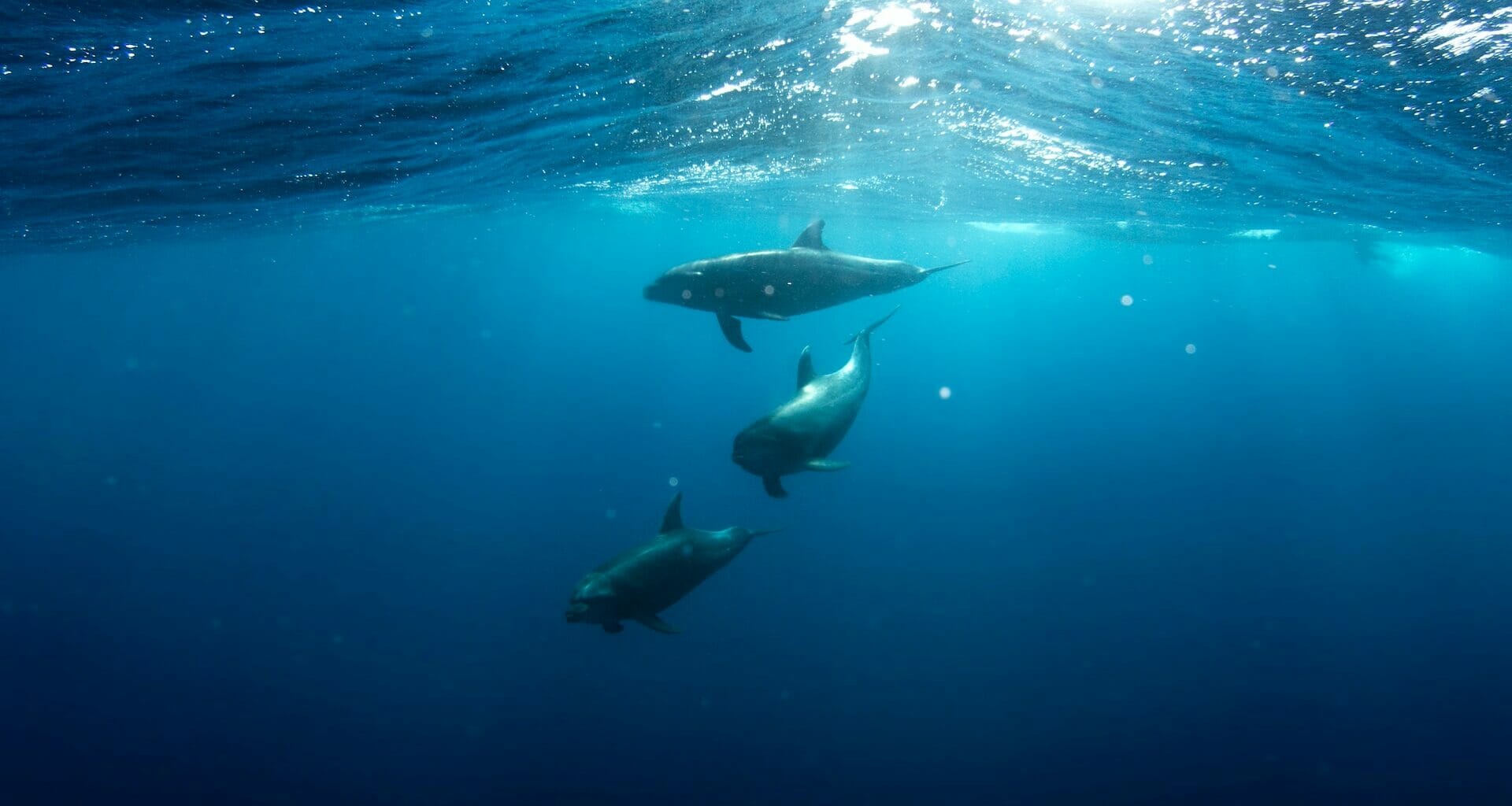NatureScot granted a two year research licence to a private company to test new technology that will disturb dolphins, porpoises and whales at several sites in Scotland, including the Sound of Harris.
The technology – called Targeted Acoustic Startle Technology (TAST) – aims to keep seals away from salmon farms by emitting a sound like a dog whistle. Its maker, GenusWave, insists that TAST is safe and does not harm cetaceans – aquatic mammals – or salmon.
But concerns have been raised by animal welfare campaigners amid calls for the research licence to be rescinded. Critics fear the acoustic devices could harm protected species such as dolphins and killer whales.
Acoustic deterrent devices (ADDs), also known as seal scarers, have been used to keep seals away from salmon farms. The farmed salmon industry claims these controversial deterrents are critical for protecting fish stocks because seals kill around 500,000 caged salmon each year.
But critics claim they cause hearing damage and stress in dolphins, porpoises and whales – and therefore breach legislation to protect cetaceans. They argue there are alternatives for the salmon industry to use to protect fish farms from seals, including the use of stronger nets.
Fish farms must obtain a European Protected Species (EPS) licence to operate an ADD unless they can demonstrate the equipment does not disturb porpoises.
Genuswave claims that TAST is “light-years more advanced than “primitive acoustic deterrent devices” because it has a lower frequency.
Documents released under freedom of information law (FOI) reveal NatureScot granted Genuswave a licence to conduct research at salmon farms run by a firm called Loch Duart. The sites included: Calbha, Reintraid, Laxford, Towgawn, Badcall Bay and Sound of Harris. The FOI request was made by the anti-fish farm campaigner, Don Staniford.
The study was to be a collaboration between the University of St Andrews and the University of Stirling, but they did not get funding for the project.
Genuswave – which did not respond to repeated requests by The Ferret for a comment – told a trade magazine this month that “TAST has been successfully deployed on salmon farms on the west coast of Scotland”.
The FOI request revealed that in July 2022, NatureScot issued a licence for Genuswave to disturb dolphins, porpoises and whales “for the purpose of science, research and education” for a two-year period, until July 2024.
NatureScot’s response also revealed that Genuswave was concerned sabout locations of the site being made public “in case of repercussions”, according to an internal email in June 2022.
We very much disagree with similar technologies being trialled at the unknown risk to marine mammal welfare.
Freddy Bowen-Bate, Animal Concern
The release of official emails also revealed NatureScot’s reasoning for issuing the licence. The public body said the licence “permits the disturbance of harbour porpoise, bottlenose, common, white beaked and risso’s dolphins, minke and killer whale” at sites operated by Loch Duart.
NatureScot said the tests will provide the farmed salmon industry with a “cetacean and farmed fish-friendly product” adding the new seal scarer aims to “reduce or eliminate the risk of disturbance to cetaceans” and reduce stress in farmed fish.
“Not carrying out this research would mean that it would be difficult to make an accurate assessment of the impact of this device on seals and cetaceans, making its future use uncertain,” NatureScot said, stating that the device operates at a much lower frequency than normal seal scarers – 1-2 kHz, instead of 10-20 kHz.
In this frequency band cetacean hearing is much less sensitive, NatureScot added, so “they should be much less likely to be disturbed” by the noise. “It is considered that there is no satisfactory alternative way of testing the impact of this device on seals and cetaceans in their natural environment to this research trial,” NatureScot said.
However, animal welfare campaigners expressed concerns. They include Freddy Bowen-Bate, secretary at Animal Concern, who said “we are very concerned” at the granting of the research licence and that “proper netting is the satisfactory alternative here.”
Bowen-Bate pointed to an Environmental Standards Scotland report last year that “demonstrated the damage caused by acoustic deterrent devices on cetaceans”, thereby breaching the laws which protect them.
He added: “We very much disagree with similar technologies being trialled at the unknown risk to marine mammal welfare when other proven non-harmful deterrent methods exist such as well-spaced double skinned anti-predator nets which have been successfully used in British Columbia and Shetland for many years”.

Don Staniford, director of $camon $cotland, said the scientific trial should “stop immediately” and that “all ADDs – including GenusWave – must be turned off” to protect cetaceans.
His views were echoed by marine biologist David Ainsley, who runs a wildlife and whale watching business in Argyll.
He said: “We believe NatureScot acted beyond their powers. To grant a licence, they should have, but did not, prove that there was no satisfactory alternative to the use of acoustic seal scarers. NatureScot did not consider that well-spaced double skinned anti-predator nets, which do not harm cetaceans, have been used in British Columbia and Shetland for years. The cost of efficient netting is not a factor in complying with the law.
“NatureScot’s decision to grant licences is irrational because the law protects all cetaceans. We believe that NatureScot should rescind these licences.”
In response to concerns, a NatureScot spokeswoman told The Ferret: “This was not a commercial licence – it was a research proposal to test the impact of acoustic devices on whales, dolphins and porpoises. As the purpose of the research was to assess the impacts of the acoustic device, an alternative was obviously not considered and instead we reviewed how the research could be conducted as safely as possible.”
She explained that before issuing the licence, NatureScot considered the implications of the proposed work on the favourable conservation status (FCS) of any European protected species potentially affected.
NatureScot’s decision to grant licences is irrational because the law protects all cetaceans.
Don Staniford, $camon $cotland
NatureScot reached the conclusion that the proposal would have “no detrimental impact” on the FCS of any whale, dolphin and porpoise species.
The spokeswoman continued: “This was based on considering the worst case disturbance scenarios, including an element of precaution. We also took account that the proposed work was a time-limited study (July 2022 to July 2024), which would be conducted with a trained observer present to ensure that no animals were within the range where hearing damage could be caused when the device would be activated.”
Genuswave reportedly told Fish Farmer Magazine this month that TAST does not harm, harass or disturb marine mammals. The article quoted Steven Alevy, a managing partner of Genuswave, who said: “In January, a farm in Scotland was losing over 1,000 fish a week to seals and an outbreak of AGD was spreading. Within days of a TAST deployment, the predation losses were cut to almost zero and the AGD health crisis ended two months later. The salmon were happier and healthier.”
A spokesperson for the University of St Andrews confirmed it applied for funding from SAIC (Sustainable Aquaculture Innovation Centre) – together with Genuswave and the University of Stirling – for a project to test whether keeping seals away from fish farms improves salmon quality. “The project was not funded, therefore we have not engaged in the study,” they explained, adding that TAST technology “does not have detrimental effects.”
“By using carefully adjusted signals, the technology manages to deter seals over a short distance of up to 200m while not affecting porpoises or whales. In fact, in this study, more whales were seen when the device was switched on than when it was off,” the spokeswoman said.
A spokesperson for Stirling University said: “The University of Stirling is not involved in this project, nor does it have plans to be involved in future proposals with this technology.”
Last year marine conservationists claimed victory after Environmental Standards Scotland (ESS) published a report on the use of ADDs effectively leading to a de facto ban, as reported by The Ferret.
Main image: Talia Cohen














